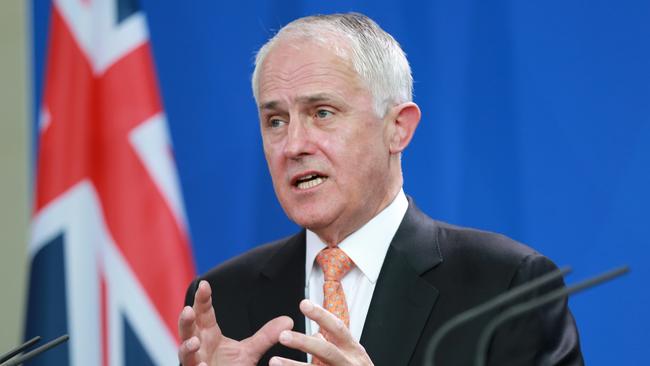The tax change Malcolm Turnbull ‘doesn’t have stomach for’
THE Budget could make or break Malcolm Turnbull’s government, and unfortunately there’s one risky change he won’t go near.

Economy
Don't miss out on the headlines from Economy. Followed categories will be added to My News.
OPINION
IT DOESN’T take an expert to tell you that the government’s ability to cut taxes is heavily restricted in the coming Budget.
It’s no secret Australia has a worsening tax-to-GDP ratio and increasing government borrowing.
Certainly, the Treasury has expended a lot of PR muscle in recent days highlighting just how much its hands are tied when it comes to the upcoming Federal Budget on May 3.
However, we are after all, in an election year and governments have never been able to resist a few sweeteners.
Moreover, with the Coalition’s support falling, they may yet see the need to offer some pre-election inducements to the mass of individual taxpayers, possibly in the form of an increase in the tax-free threshold or some changes in the higher tax thresholds to reduce the impact of bracket creep.
Nevertheless, when it comes to income tax, an actual cut in the headline rate is unlikely.
Mr Morrison needs to find the balance between inducements and credibility, and such a measure, given the economic climate, would clearly be a step too far.
Tax accountants H&R Block have put forward some predictions for Budget 2016:
1. Company Tax
We know that the government has been spruiking a cut to corporate tax levels to boost innovation and growth and despite a mass of opinion poll data showing the electorate isn’t convinced (even more so in the light of recent revelations about tax havens), we think that a reduction in the headline rate of corporate tax is quite likely.
However, the extent of that cut is likely to be modest, possibly a reduction in the headline rate to 28.5 per cent to match the “small companies” rate introduced last year.
2. Other corporate reforms
The introduction of the $20,000 instant asset write-off for small companies was one of the few undoubted success stories of the last couple of Budgets.
That relief is due to expire in June 2017 and we think there’s a fighting chance that it will either be extended or made permanent.
There have also been steady calls for changes in the system of loss relief for companies to allow small companies (in particular) the ability to carry losses back against previous profits, as well as forward against future ones.
The Gillard government actually implemented such a scheme but the Abbott government then scrapped it. It was, however, popular with small business and the Turnbull government would likely win kudos from the small business community for reintroducing the scheme.
3. Changes to negative gearing
The opposition has promised change and even the Treasurer has talked of “excesses” but we don’t believe the government has the stomach to make reforms which will upset so many of their natural supporters. Despite a barrage of media noise to the contrary, we expect change here to be off the table.

4. Work-related deductions
Another area which has been focused on to save some dollars is the system of allowing deductions for work-related expenses.
A House committee has been looking at this and we know the government has been studying carefully the potential impact of change. We don’t believe the economics stack up and the politics certainly don’t — many core voters stand to be hit hard by such a change — so on balance we believe the government will leave this area alone.
5. Superannuation
The government has been frantically ruling tax measures out over recent months, but the one door they have left open is change to the superannuation rules, which allow generous tax reliefs, particularly for higher earners.
As such, we believe change here is a virtual certainty.
The government will be keen to avoid any perception of retrospectivity (changing the rules for money already in the super system) so that might close off options to increase tax rates on funds already in the super system or changes to the way super is withdrawn.
That leaves changes to the way money is put into super in the first place, including reducing the amounts which can be contributed at concessional rates, either by tightening up on caps or increasing the tax rate on money paid into super.
We expect such measures to be targeted at higher earners who are sometimes accused of using super as a tax shelter, rather than as a vehicle for retirement savings.
6. GST
Just too scary! The government won’t go here, certainly not in an election year.
We know this was a preferred option for change some months ago but a political scare campaign
by the Opposition together with some ambivalent economic modelling seems to have confirmed the view that GST changes are all “political pain for no economic gain.”
Originally published as The tax change Malcolm Turnbull ‘doesn’t have stomach for’


